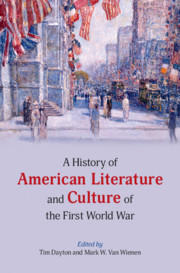Book contents
- A History of American Literature and Culture of the First World War
- A History of American Literature and Culture of the First World War
- Copyright page
- Contents
- Figures
- Contributors
- Acknowledgments
- Introduction America’s Great War at One Hundred (and Counting)
- Part I Genre and Medium
- Chapter 1 Poetry
- Chapter 2 Fiction
- Chapter 3 Film
- Chapter 4 Drama
- Chapter 5 Popular Music
- Chapter 6 Journalism
- Chapter 7 Memoirs
- Chapter 8 Art and Illustration
- Part II Settings and Subjects
- Part III Transformations
- References
- Index
Chapter 4 - Drama
From Literary Fantasy to Gritty Realism
from Part I - Genre and Medium
Published online by Cambridge University Press: 23 January 2021
- A History of American Literature and Culture of the First World War
- A History of American Literature and Culture of the First World War
- Copyright page
- Contents
- Figures
- Contributors
- Acknowledgments
- Introduction America’s Great War at One Hundred (and Counting)
- Part I Genre and Medium
- Chapter 1 Poetry
- Chapter 2 Fiction
- Chapter 3 Film
- Chapter 4 Drama
- Chapter 5 Popular Music
- Chapter 6 Journalism
- Chapter 7 Memoirs
- Chapter 8 Art and Illustration
- Part II Settings and Subjects
- Part III Transformations
- References
- Index
Summary
The response to the Great War in both the commercial and the non-profit theater in the United States was substantial, with different trends emerging during the periods of U. S. neutrality, intervention, and postwar reflection. Although the Espionage Act squelched all but the most propagandistic pro-war plays and reviews, opposition to the war and the country’s entry into it was feely dramatized alongside pro-war plays before its passage. The country’s most celebrated playwright, Eugene O’Neill, explored the effects of war trauma during the war and its aftermath in The Sniper (1917), Shell Shock (1918), Strange Interlude (1928), and Mourning Becomes Electra (1931). In the decade after the war, Maxwell Anderson and Laurence Stallings’s What Price Glory (1924) and its film adaptations, established a consciously realistic perspective on the war from the soldier’s point of view in America’s cultural consciousness. After the Armistice, pacifist views also found effective expression in the fantasy and historical analogy of Edna St. Vincent Millay’s Aria da Capo (1919) and Robert Sherwood’s The Road to Rome (1927).
Keywords
- Type
- Chapter
- Information
- Publisher: Cambridge University PressPrint publication year: 2021



